The Noveltoons had already spun off Casper as a separate series. There were several other possible series contenders, who would wither achieve their own series later or become recognized “Stars” when Harvey featured the characters in comics and television. The series also continued to keep going with its own periodic one-shot cartoons, before a later move that would divide the one-shots between the “Noveltoons” and “Modern Madcap” banners.
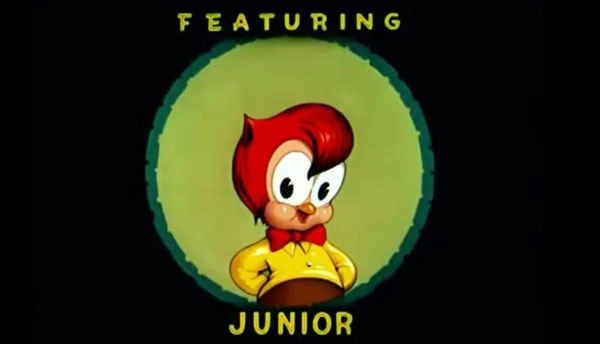
With apologies, I dip backwards for a Noveltoon which I overlooked. Teacher’s Pest (3/31/50) – Mama Owl is as proud as punch. Her little boy Junior is going to school for the first time today. As Junior walks to school, he attracts the attention of Wolfie, who is only interested in one thing – a blue plate breakfast. Wolfie paints an old barn red, and disguises himself as a schoolteacher. He gives Junior a special seat – inside a cauldron. Mama Owl realizes she’s forgotten to pack Junior’s lunch, and brings it to the fake schoolhouse. In so doing, she attracts Wolfie’s attention with her pulchritude. “So round, so fat, so fully packed.” However, Junior rescues Mama, giving Wolfie a special recital of his lessons, landing Wolfie in the pot, giving him a taste of just how hot the hot seat is. Wolfie pops off for the distant horizon, and Junior dons Wolfie’s mortarboard as a sign of his matriculation. Songs: “I’ll Be Graduating Soon”, an original as Junior walks to school, and with a further coda at the finale. Never commercially recorded. Also, “One Two, Buckle My Shoe”, with two sets of custom lyrics as Wolfie and then Junior recite the lessons.
Cat-Choo (10/12/51) – Katnip has a terrible cold. He finds a “sure cure” in one of his inevitable books, telling him to cook up some crow meat in a deep dish stew. He hears Buzzy singing outside. Buzzy has not migrated south, and is skating on a frozen bird bath. Katnip uses a magnet tied to a clothes line to pick up Buzzy by the skates, and drag him inside the house. Once Buzzy finds the cat has a cold, he responds “That’s all I has to know.” Buzzy uses several violent methods to cure Katnip of his cold, including a mixture of various hot sauces, which results in some spectacular animation of Katnip bouncing around the house to the sound of bells and whistles, and launching a fireworks display out the end of his tail. Katnip has never heard of the old wisdom, “If you treat a cold, it will last 7 days, If you don’t treat it, it will last a week.” Katnip ultimately lies frozen in ice, with Buzzy skating the words “The End” over the top of him.
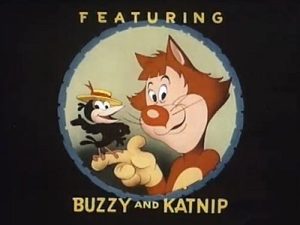 Song: “Over the Waves”, with new original lyrics explaining why Buzzy has not flown South (the weather dissuades the cats from chasing him, with “cold feet – Ten will get you five, they won’t be round to put on the heat”. “Over the Waves” was written by Juventino Rosas, a Mexican composer of the mid-10th century. An early version circa 1904 appeared on Monarch records (a Victor division) as “Dance Orchestra”. Other early recordings included Sousa’s Band on Victor (later replaced in catalog by an Arthur Pryor version). Several accordion versions included Pietro on Victor, the Marconi Brothers (duo-accordionists) on Columbia, and Mario Perry on Victor (Perry died in an auto accident which almost killed Joe Venuti, while he was employed with the Paul Whiteman orchestra). In 1927, Nat Shilkret recorded a 12″ concert version on Victor as the “International Novelty Orchestra”, played in more or less Viennese manner, which remained a good seller in catalog for many years. The Cartwright Brothers, a country group from Texas, recorded a Columbia version in the late ‘20’s. Vocalion released one under the name “The Northlanders” in their country series. Bill Boyd and his Cowboy Ramblers also gave it a country feel in the 30’s on Bluebird. Harry Horlick performed it later on Decca, as well as a jazz version by Bob Crosby on Decca. The song was often associated with circus acrobats, and was played for such purpose by Rex Irving (really Irving Riskin, former pianist with Jean Goldkette) on Royale as “The Acrobat”. Moon Mullican performed it on King. Sharkey Bonano did a dixieland version on Capitol. Notably, another new lyric to the same piece had appeared earlier in the year on RCA Victor, providing a massive hit for Mario Lanza as “The Loveliest Night of the Year.”
Song: “Over the Waves”, with new original lyrics explaining why Buzzy has not flown South (the weather dissuades the cats from chasing him, with “cold feet – Ten will get you five, they won’t be round to put on the heat”. “Over the Waves” was written by Juventino Rosas, a Mexican composer of the mid-10th century. An early version circa 1904 appeared on Monarch records (a Victor division) as “Dance Orchestra”. Other early recordings included Sousa’s Band on Victor (later replaced in catalog by an Arthur Pryor version). Several accordion versions included Pietro on Victor, the Marconi Brothers (duo-accordionists) on Columbia, and Mario Perry on Victor (Perry died in an auto accident which almost killed Joe Venuti, while he was employed with the Paul Whiteman orchestra). In 1927, Nat Shilkret recorded a 12″ concert version on Victor as the “International Novelty Orchestra”, played in more or less Viennese manner, which remained a good seller in catalog for many years. The Cartwright Brothers, a country group from Texas, recorded a Columbia version in the late ‘20’s. Vocalion released one under the name “The Northlanders” in their country series. Bill Boyd and his Cowboy Ramblers also gave it a country feel in the 30’s on Bluebird. Harry Horlick performed it later on Decca, as well as a jazz version by Bob Crosby on Decca. The song was often associated with circus acrobats, and was played for such purpose by Rex Irving (really Irving Riskin, former pianist with Jean Goldkette) on Royale as “The Acrobat”. Moon Mullican performed it on King. Sharkey Bonano did a dixieland version on Capitol. Notably, another new lyric to the same piece had appeared earlier in the year on RCA Victor, providing a massive hit for Mario Lanza as “The Loveliest Night of the Year.”
Audrey the Rainmaker (10/29/51) – Audrey wants to play outside, but it’s raining again. Audrey wishes hard that it would never rain. 108 days later, there hasn’t been any rain. The Mississippi has become bone dry. Niagara Falls is reduced to a drip. And people are going to water “speak easies” (“Joe sent me”), for a single drop of water on their tongue. Even Audrey has noticed the change, as her flower garden is withering away. (It’s a wonder that one of her flowers doesn’t go into one of those overly-dramatic death scenes.) A vagrant drop of water tells Audrey to go see the rainmaker and beg him to release rain down to the Earth. The droplet shows Audrey how to take the rainbow (no leprechauns or crocks of gold at its end) to the land of the rainmaker. The rainmaker is a hard-nosed character, who lives on the style and splendor of a Greek god, but proves to have a sentimental streak, especially concerning flowers. His domain includes departments for “spring showers” (boing boing), raining cats and dogs (bow wow/meow), and raining pitchforks. Audrey wishes to cancel her wish that it never rain again. “Tish tish, a wish is a wish”, responds the rainmaker unsympathetically. But he softens considerably when Audrey performs a full chorus of “April Showers”, and becomes quite blubbery when hearing the references to violets and daffodils, weeping with such force that he floods his domain, sending torrents of rain back down to earth. The film ends with Audrey back at home, down the rainbow, and enjoying the rain with the remark, “Love that Rainmaker.”
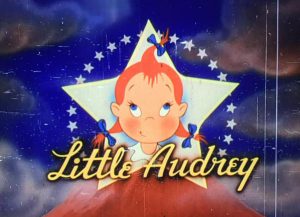 Songs: “April Showers”, a 1922 pop song which became associated with Al Jolson. Jolson recorded it for Columbia in such year, for Brunswick in 1933 (accompanied by Guy Lombardo and his Royal Canadians), and for Decca in 1946. Jolson also sang it in he 1926 Vitaphone short, “Al Jolson in a Plantation Act”, which is required viewing for anyone who wants to understand why he was referred to as “The World’s Greatest Entertainer”. Victor gave the tune to Charles Harrison, and also produced an early dance version with Paul Whiteman. Arthur Fields also covered it on Regal and related labels. The Metropolitan Dance Orchestra would perform a standard dance rendition on Banner et al. Wiedoeft’s Californians (a dance band fronted by saxophone virtuoso RudyWiedoeft) also issued a dance version on red Vocalion. Ray Noble and his American orchestra would perform a later version for Columbia. In England, a dance version appeared on Decca by Josephine Bradley and her Ballroom Orchestra. Margaret Whiting did a version for Capitol in the late 1940’s. Dennis Day also provided a vocal on RCA Victor. Ben Light would issue a piano solo on Tempo.
Songs: “April Showers”, a 1922 pop song which became associated with Al Jolson. Jolson recorded it for Columbia in such year, for Brunswick in 1933 (accompanied by Guy Lombardo and his Royal Canadians), and for Decca in 1946. Jolson also sang it in he 1926 Vitaphone short, “Al Jolson in a Plantation Act”, which is required viewing for anyone who wants to understand why he was referred to as “The World’s Greatest Entertainer”. Victor gave the tune to Charles Harrison, and also produced an early dance version with Paul Whiteman. Arthur Fields also covered it on Regal and related labels. The Metropolitan Dance Orchestra would perform a standard dance rendition on Banner et al. Wiedoeft’s Californians (a dance band fronted by saxophone virtuoso RudyWiedoeft) also issued a dance version on red Vocalion. Ray Noble and his American orchestra would perform a later version for Columbia. In England, a dance version appeared on Decca by Josephine Bradley and her Ballroom Orchestra. Margaret Whiting did a version for Capitol in the late 1940’s. Dennis Day also provided a vocal on RCA Victor. Ben Light would issue a piano solo on Tempo.
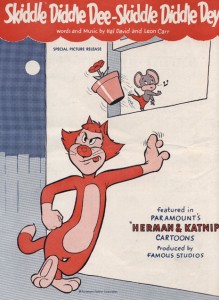 Mice Capades (10/3/52) – Although this would mark the first installment of the official “Herman and Katnip” series”, I will take the liberty of including it and others in the series under the banner of Noveltoons coverage, in view of the character’s long past association with the series. A classic instance of mind-play, as Herman essentially resorts to “Hubie and Bertie” style tactics, convincing Katnip he is deceased with the use of a poison label affixed to what is really a bottle of vinegar. Lining the attic with white cotton batting, Herman creates a “heaven”, accessed through the apartment’s dumb-waiter, where Herman acts as judge to sentence Katnip to a trip down to “the fiery furnace” unless he atones for his sins against the mice. Katnip is “returned” to Earth to perform good deeds by laying out a feast for the rodents, but discovers the doctored vinegar bottle. Confronting the mousehole with a shotgun, he receives a shocking recoil, as the mice bend the rifle barrels backwards to aim at Katnip. The cat’s soul rises, now transparent and actually deceased, but still wants revenge. “Uh uh. Remember the fiery furnace”, warns Herman. Katnip’s ghost decides to play safe rather than face all that again, by staying Earthbound to wait hand and foot on the mice anyway. Song: A new theme for the series, “Skiddle Diddle Dee – Skiddle Diddle Dey”, appears for the first time, written by Hal David (brother of Mack David, another celebrated Hollywood lyricist) and Leon Carr. Hal would go on to collaborate regularly with Burt Bacharach on virtually all of Bacharach’s hits. The theme was published as sheet music, but is not known to have been commercially recorded.
Mice Capades (10/3/52) – Although this would mark the first installment of the official “Herman and Katnip” series”, I will take the liberty of including it and others in the series under the banner of Noveltoons coverage, in view of the character’s long past association with the series. A classic instance of mind-play, as Herman essentially resorts to “Hubie and Bertie” style tactics, convincing Katnip he is deceased with the use of a poison label affixed to what is really a bottle of vinegar. Lining the attic with white cotton batting, Herman creates a “heaven”, accessed through the apartment’s dumb-waiter, where Herman acts as judge to sentence Katnip to a trip down to “the fiery furnace” unless he atones for his sins against the mice. Katnip is “returned” to Earth to perform good deeds by laying out a feast for the rodents, but discovers the doctored vinegar bottle. Confronting the mousehole with a shotgun, he receives a shocking recoil, as the mice bend the rifle barrels backwards to aim at Katnip. The cat’s soul rises, now transparent and actually deceased, but still wants revenge. “Uh uh. Remember the fiery furnace”, warns Herman. Katnip’s ghost decides to play safe rather than face all that again, by staying Earthbound to wait hand and foot on the mice anyway. Song: A new theme for the series, “Skiddle Diddle Dee – Skiddle Diddle Dey”, appears for the first time, written by Hal David (brother of Mack David, another celebrated Hollywood lyricist) and Leon Carr. Hal would go on to collaborate regularly with Burt Bacharach on virtually all of Bacharach’s hits. The theme was published as sheet music, but is not known to have been commercially recorded.
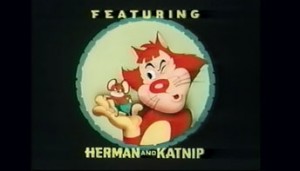 Of Mice and Magic (2/20/53) – Within an old theater, the mice are putting on a show, with a femme fatale mouse named Louise (voiced by Mae Questel) as the star performer. This wakes up Katnip, who immediately rushes the stage for his midnight snack, trying to catch as many mice as he can, but winding up only with Louise, who he locks in a rat cage. Enter Herman, who, when he finds out what happened, springs into action. Eventually, Herman gets hold of Marvo the Magician’s magic wand, and uses it to get the better of Katnip, cutting him down to size until the cat is smaller than he. Herman uses the wand to unlock the cage, then departs amidst the cheers of the other mice with Louise, riding the wand like a broomstick. He receives an intoxicating kiss for his reward. Songs: “Personality”, written by Johnny Burke and Jimmy Van Husen for the Crosby/Hope picture, “Road to Utopia”, is performed in the cartoon by Questel, and received at least four recordings. Bing recorded it on Decca with Eddie Condon in support. But the real action seems to have gone to Johnny Mercer and the Pied Pipers with a swinging uptempo feel on Capitol. Other versions included Dinah Shore on RCA Victor, and Pearl Bailey on Columbia. Also included in the film is a vocal refrain by Herman of “Louise” – for once performed without any attempt to replicate a Maurice Chevalier French accent.
Of Mice and Magic (2/20/53) – Within an old theater, the mice are putting on a show, with a femme fatale mouse named Louise (voiced by Mae Questel) as the star performer. This wakes up Katnip, who immediately rushes the stage for his midnight snack, trying to catch as many mice as he can, but winding up only with Louise, who he locks in a rat cage. Enter Herman, who, when he finds out what happened, springs into action. Eventually, Herman gets hold of Marvo the Magician’s magic wand, and uses it to get the better of Katnip, cutting him down to size until the cat is smaller than he. Herman uses the wand to unlock the cage, then departs amidst the cheers of the other mice with Louise, riding the wand like a broomstick. He receives an intoxicating kiss for his reward. Songs: “Personality”, written by Johnny Burke and Jimmy Van Husen for the Crosby/Hope picture, “Road to Utopia”, is performed in the cartoon by Questel, and received at least four recordings. Bing recorded it on Decca with Eddie Condon in support. But the real action seems to have gone to Johnny Mercer and the Pied Pipers with a swinging uptempo feel on Capitol. Other versions included Dinah Shore on RCA Victor, and Pearl Bailey on Columbia. Also included in the film is a vocal refrain by Herman of “Louise” – for once performed without any attempt to replicate a Maurice Chevalier French accent.
Hair Today, Gone Tomorrow (4/16/54) – Katnip is in a fix, this time brought on by himself. Using a too-harsh steel comb to doll himself up for a heavy date, Katnip rips out all the fur off his scalp, until he is bald as a billiard ball. His handy book of cures recommends a pomade made of fresh caught crow. Buzzy is the usual target, and is sucked down the drain of a birdbath into Katnip’s kitchen by the cat’s use of a plunger at the kitchen sink. Katnip tries to press Buzzy in an orange press, but Buzzy claims to be the only living soul knowing the secret of growing hair. With his date in half an hour, Katnip undergoes a glue-on of some upholstery (with couch spring within to bounce the toupee off), grass seed on mud (producing green hair that falls off like a divot), a stimulating massage (with a sander, making him a flathead), and an egg shampoo (which fries on Katnip’s brow from the heat of a singe). Katnip seizes Buzzy, intent on following the book recipe, while Buzzy begs him not to split hairs. The two disappear in a fight cloud, but suddenly the fight breaks up, as Buzzy announces, “Look boss. Genuine natural hair.” Indeed Katnip looks his old self, and for once thanks Buzzy with a handshake for really coming through. He exits for his date, not realizing that a large chunk of fur is absent from his backside. Buzzy reveals to us the wonder implement with which he accomplished the trick – a large scissor. Songs: “Love in Bloom” (with new lyric), “Listen to the Mocking Bird”, and an oldie from Stephen Foster showing up as a newcomer, “I Dream of Jeannie with the Light Brown Hair” (with new lyrics for Buzzy). Lambert Murphy performed an acoustical version on blue seal Victor. John McCormack produced an electrical version on HMV with very live concert sound. Jussi Bjorling also performed it for HMV. Bing Crosby provided a Decca version. Glenn Miller issued in on Bluebird and later as an aircheck with his Army Air Corps band. Carroll Gibbons performed an English version on Columbia. Lew White gave us an organ version on RCA Victor. Richard Crooks also got in on Victor for the red seal fans. Mitch Miller included it on one of his many LP sing-alongs.
The Oily Bird (8/20/54) – Virtually a remake of Tex Avery’s The Early Bird Dood It, with bird and worm characters closely resembling Avery’s originals. The resemblance becomes striking when “Inchy” copies the same gag as Avery’s worm, playing a solemn version of “Taps”, then jazzing it up in celebration. There is also a nod to Avery with a peace treaty quickly violated, reminding one of The Blitz Wolf. Songs: “Funeral March” by Chopin, which originated out of one of his piano sonatas, and “Taps” or “Last Post”.
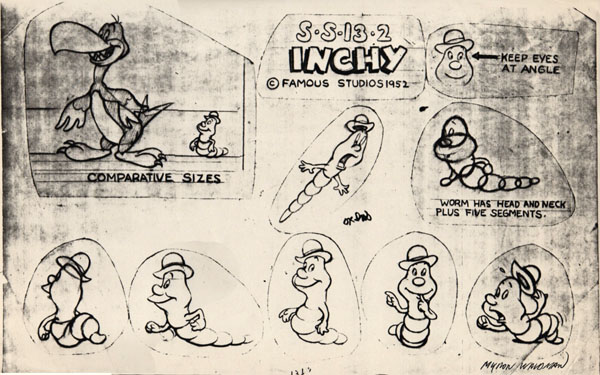
Myron Waldman’s model sheet for “The Oily Bird”
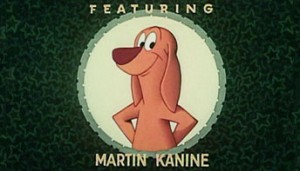 Fido Beta Kappa (10/24/54) – Martin Canine (a play on name of a live detective show of the period, “Martin Cane”, starring William Gargan on NBC) is an uneducated bumbler of a hunting dog, who “fowls” up his master’s duck hunting trip at every turn, until he begs for his master’s mercy, on account of he never received any formal education. His story touches his master’s heart, and he sends Martin to dog college (Dog Gone U.). Martin returns in cap and gown, with diploma in hand, having graduated Fido Beta Kappa and Summa Cum Laude. He demonstrates scientific stick retrieving (using a self-returning boomerang), and accompanies his master into the field, using a tuning fork to detect the frequencies of approaching duck wings in a thick fog, allowing the entire flock to be brought down with one shot. A storm develops, and lightning splits a tree in two. Martin leaps into the center of the split tree, asserting that lightning never strikes twice in the same place. His master kicks him away and assumes his place of apparent safety, remarking “He hasn’t been wrong yet.” Another bolt appears on cue, splitting master in half. Martin appears upset, but is merely miffed at his educator. “I shall speak to my professor about that”. Songs: “Gaudeamus Igitur”, a text that dates back to 1287 in France, later set to music – a marker for anything seriously collegiate. Mario Lanza performed it in “The Student Prince”, both in studio and soundtrack recordings for RCA Victor.
Fido Beta Kappa (10/24/54) – Martin Canine (a play on name of a live detective show of the period, “Martin Cane”, starring William Gargan on NBC) is an uneducated bumbler of a hunting dog, who “fowls” up his master’s duck hunting trip at every turn, until he begs for his master’s mercy, on account of he never received any formal education. His story touches his master’s heart, and he sends Martin to dog college (Dog Gone U.). Martin returns in cap and gown, with diploma in hand, having graduated Fido Beta Kappa and Summa Cum Laude. He demonstrates scientific stick retrieving (using a self-returning boomerang), and accompanies his master into the field, using a tuning fork to detect the frequencies of approaching duck wings in a thick fog, allowing the entire flock to be brought down with one shot. A storm develops, and lightning splits a tree in two. Martin leaps into the center of the split tree, asserting that lightning never strikes twice in the same place. His master kicks him away and assumes his place of apparent safety, remarking “He hasn’t been wrong yet.” Another bolt appears on cue, splitting master in half. Martin appears upset, but is merely miffed at his educator. “I shall speak to my professor about that”. Songs: “Gaudeamus Igitur”, a text that dates back to 1287 in France, later set to music – a marker for anything seriously collegiate. Mario Lanza performed it in “The Student Prince”, both in studio and soundtrack recordings for RCA Victor.
Next Post: Screen Songs 1950 – 51.


 James Parten has overcome a congenital visual disability to be acknowledged as an expert on the early history of recorded sound. He has a Broadcasting Certificate (Radio Option) from Los Angeles Valley College, class of 1999. He has also been a fan of animated cartoons since childhood.
James Parten has overcome a congenital visual disability to be acknowledged as an expert on the early history of recorded sound. He has a Broadcasting Certificate (Radio Option) from Los Angeles Valley College, class of 1999. He has also been a fan of animated cartoons since childhood.











































Actually, he said “So round, so fat, so fully stacked!”
Oh wow, I had no idea Hal David wrote the lyrics to “Skiddle Diddle Dee”. Too bad Dionne Warwick never recorded it.
Of course “mid-10th century” is a typo, but the all too brief musical career of Juventino Rosas was in the late (not mid) 19th century. “Over the Waves” was a sensation when his orchestra played it at the Columbian Exposition in Chicago in 1893. Sadly, he died while touring Cuba the following year at age 26.
Violinist Jascha Heifetz often played his own arrangement of “I Dream of Jeanie with the Light Brown Hair” in recital as an encore. His arrangement is still in print and is regularly performed by violinists all over the world. Heifetz himself recorded it on his album of Concert Encores, released by Decca in 1951.
“Gaudeamus Igitur” was notably used by Johannes Brahms in the grandiose coda of his “Academic Festival Overture”, composed for the occasion when he received an honorary doctorate from the University of Breslau. The Latin lyrics exhort us to make the most of our youth, because when it’s gone, we can never get it back.
“Personality” is a song that invariably makes me think of the Wesson oil commercials that Florence Henderson made in her post-Brady years. “The chicken’s got a certain Wessonality!”
Louise in “Of Mice and Magic” is clearly Betty Boop reincarnated as a 1950s mouse. And beautifully animated besides, proving the former Fleischer artists hadn’t completely lost their touch. It’s a shame there isn’t more footage of her.
The use of crow products to cure Katnip’s afflictions is, as Charles Solomon once so correctly wrote, “a premise as unappetizing as it is unfunny.”
Mack David, mentioned in passing here, had quite an association with songs written for animated cartoons; from “You Can See With Your Heart” (“The Enchanted Square”) to Disney songs like “A Dream Is A Wish,” “Bibbidi-Bobbidi-Boo” and “The Unbirthday Song” to “This Is It!”, the Bugs Bunny TV theme. I think he and Jerry Livingston co-wrote most if not all of the Warner Bros. TV series themes in the late 1950’s-early 60’s, but that was probably the most lucrative for them due to the endless reruns of the show.